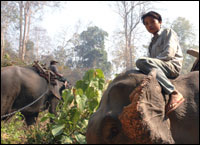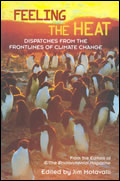Asia
-
Getting distracted
There the World Health Organization goes again: Millions of Asians could face poverty, disease, and hunger as a result of rising temperatures and increased rainfall expected to hit hardest poor countries, the World Health Organization warned Monday. Malaria, diarrhea, malnutrition and floods cause an estimated 150,000 deaths annually, with Asia accounting for more than half, […]
-
With oil prices rising, Asia turns to coal
You may have heard that oil prices are flirting with $100 a barrel; what’s an oil-dependent, energy-hungry globe to do? In Asia, home to a third of the world’s proven coal reserves, the answer seems obvious. Across the continent, billions of dollars are being poured into R&D of coal-to-liquid fuel and coal-bed methane extraction. Some […]
-
East Asian countries could save money shifting to renewables, but aren’t gonna
According to Greenpeace International, East Asian countries can save about $2 trillion in fuel costs over the next 23 years by shifting to renewable energy (abandoning plans for both coal and nuclear plants). Said dazzlingly monickered Greenpeace campaign coordinator Athena Ballasteros … … investment costs for new power plants in East Asia projected by the […]
-
Logging keeps Asian elephants in business … for now
At a fork in the road, our guide points to the right. “That’s the main road there,” he says. “We’ll go on this smaller road, deep into the jungle.” A glance to the left reveals a narrow, unpaved track, which he tells us is used primarily by logging trucks. It’s the dry season in Myanmar, […]
-
New Asia-Pacific climate pact is long on PR, short on substance
Staunch U.S. allies, enviro activists, and just about everyone else was caught flat-footed last week when the U.S., Australia, and four Asian countries unveiled a new pact intended to help curb greenhouse-gas emissions. In the days since, some details about the surprise alliance have trickled out, but its mission and intended impact remain murky. Known […]
-
How a little blue pill could get big results — in species conservation, we mean
Quick: what do sea turtles, black bears, and Philippine fruit bats have in common? Rise up on behalf of the turtles. At first glance, not much. They don’t look alike, and they have very different ranges and habitats. In fact, one would be hard-pressed even to find them on any of the same guest lists. […]
-
Enviro-justice activists send a dispatch from a panel with The Reapers
Thursday, 3 Mar 2005 SAN FRANCISCO, Calif. The Asian Pacific Environmental Network was invited to speak on a panel yesterday with “Death of Environmentalism” coauthor Michael Shellenberger, Taj James, executive director of the Movement Strategy Center, and Adam Werbach, past president of the Sierra Club. The goal was to broaden the debate about the future […]
-
An excerpt from Feeling the Heat sizes up the ominous Asian Cloud
The Indian city of Mumbai, formerly Bombay, is home to one of Asia's largest slums and endures among the worst air quality on earth. Half the city's population lacks running water or electricity, and the smoke from countless wood-burning cooking fires joins with the acrid haze from two-stroke auto rickshaws, diesel buses, and coal-fired power plants to all but choke the city. Breathing Mumbai's air, reports the Lonely Planet travel guide, is equivalent to smoking 20 cigarettes a day. Comparable air quality wraps New Delhi, Bangalore, and 69 of India's 70 principal cities year-round, according to a 1997 study by India's Central Pollution Control Board.
-
Well To-Do
Farmers Across Asia Emptying Underground Water Tables Farmers in India, Pakistan, Vietnam, and northern China are setting themselves up for drought and famine in decades to come by pushing wells deep into the ground, emptying underground reserves at a rate faster than precipitation can replenish them. India’s government system of irrigation canals is decrepit, so […]


